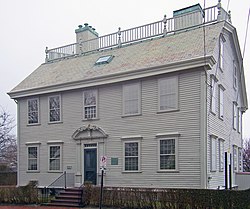Hunter House (Newport, Rhode Island)
|
Hunter House
|
|

Front elevation of house in 2008
|
|
| Location | Newport, RI |
|---|---|
| Coordinates | 41°29′33.19″N 71°19′18.14″W / 41.4925528°N 71.3217056°WCoordinates: 41°29′33.19″N 71°19′18.14″W / 41.4925528°N 71.3217056°W |
| Built | 1748 |
| Architectural style | Georgian |
| Part of | Newport Historic District (#68000001) |
| NRHP Reference # | 68000003 |
| Significant dates | |
| Added to NRHP | November 24, 1968 |
| Designated NHL | November 24, 1968 |
| Designated NHLDCP | November 24, 1968 |
Hunter House (1748) is a historic house in Newport, Rhode Island. It is located at 54 Washington Street in the Easton's Point neighborhood, near the northern end of the Newport Historic District.
The original portion of Hunter House was built in 1748 for Colonial Deputy Governor Jonathan Nichols Jr. The architecture of Hunter House is currently Georgian Colonial. This large 2½-story house has a balustraded gambrel roof and heavy stud construction. In 1756, the property was sold to Colonel Joseph Wanton Jr., who was a deputy governor of the colony and a merchant. Wanton enlarged the house by adding a south wing and a second chimney, transforming the building into a formal Georgian mansion with a large central hall. During the American Revolution, Wanton remained a Loyalist, and General William West ordered Wanton imprisoned in Providence and tried by the legislature. Eventually, Wanton fled Newport when the British left the city. Local legend has it that when Wanton and other Loyalists were fleeing Newport, space aboard British ships were at a premium, but Wanton had his own vessel filled with goods and merchandise in preparation for what he hoped would be a short exile. however, whilst bidding farewell to his wife onshore, who was staying in Newport to look after the family's interests, his ship loaded with his worldly possessions took off northwards, up Narragansett Bay towards Providence and the rebel authorities there, with the intention of turning over the ship as a prize of war, thus gaining the vessel's captain and its crew a share of the prize money while simultaneously depriving Wanton of his wealth. Wanton will die penniless shortly thereafter in British-controlled New York City. After Wanton fled, the house was used as the headquarters of Admiral de Ternay, commander of the French fleet, when French forces occupied Newport in 1780. After the war, William Hunter, a U.S. Senator and ambassador, bought Wanton's house and transformed it into a formal Georgian mansion with a large central hall.
...
Wikipedia

